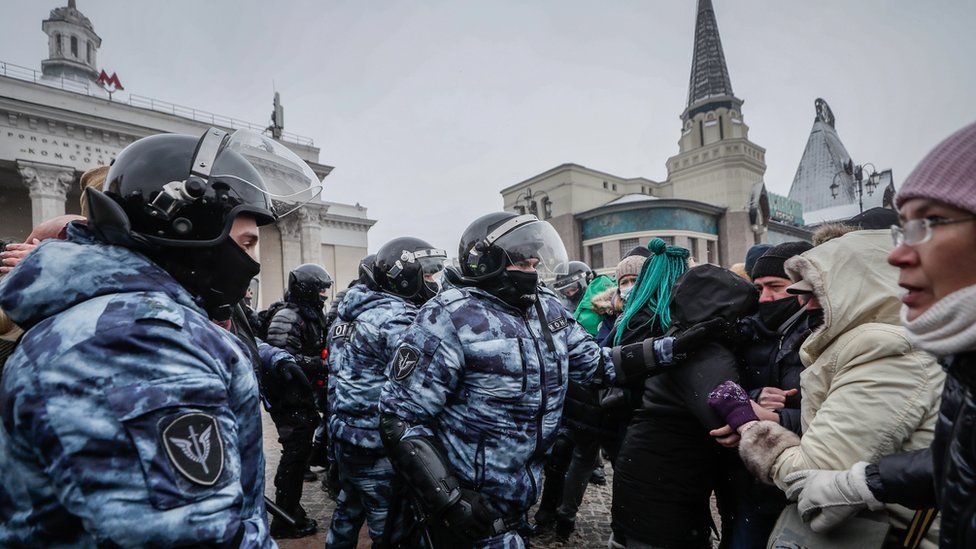
Russia has expelled three diplomats from Germany, Sweden and Poland for joining protests in support of opposition activist Alexei Navalny, who was jailed earlier this week.
The Russian foreign ministry said the three took part in "illegal demonstrations" on 23 January.
The diplomats' home countries have condemned the expulsions, as have the UK, France and the EU.
Mr Navalny is a vociferous critic of Russian President Vladimir Putin.
The expulsions were announced just a few hours after EU foreign affairs chief Josep Borrell met Russian Foreign Minister Sergei Lavrov in Moscow.
Hundreds of thousands of people took part in protests in support of Mr Navalny across Russia on 23 and 31 January. Thousands were arrested.
Germany denounced the expulsion as being "in no way justified" and said it would not "go unanswered" if Russia did not reconsider.
Sweden said the claim that its diplomat took part in the protest on 23 January was unfounded and said it reserved the right to an appropriate response.
Poland said the expulsion could lead to the "further deepening of the crisis in bilateral relations".
Mr Borrell, on behalf of the EU, said he "strongly condemned this decision and rejected the allegations that they conducted activities incompatible with their status as foreign diplomats".
However, Mr Lavrov said any European sanctions over Mr Navalny's treatment would be illegitimate.
Both Germany and Poland said they had summoned their respective Russian ambassadors to express concern over the expulsions - a move that could possibly lead to tit-for-tat measures and more diplomats being sent home.
Who is Alexei Navalny?
Mr Navalny, 44, is a political activist who has campaigned against corruption and Mr Putin since 2011.
Last August he was poisoned with a nerve agent in eastern Russia and taken to Germany for treatment. He returned home at the end of January, despite warnings from the Russian government that he would be arrested.
He was then jailed for three-and-a-half years for what prosecutors said was a violation of the terms of a suspended sentence for fraud in 2014. A year was later deducted from his sentence for time served under house arrest.
Mr Navalny accuses Mr Putin of running an administration riddled with corruption and of organising the poison attack that nearly killed him.
Shortly after his return to Russia, Mr Navalny released a YouTube video featuring an opulent Black Sea palace which, he alleged, was a Russian billionaires' gift to the president. More than 100 million people have watched the video.
Mr Putin has denied ownership. Last week Arkady Rotenberg, a billionaire businessman close to Mr Putin, came forward to say he bought the palace two years ago.
Mr Navalny will be back in court on 12 February on charges of defaming a World War Two veteran.
https://news.google.com/__i/rss/rd/articles/CBMiMGh0dHBzOi8vd3d3LmJiYy5jby51ay9uZXdzL3dvcmxkLWV1cm9wZS01NTk1NDE2MtIBNGh0dHBzOi8vd3d3LmJiYy5jby51ay9uZXdzL2FtcC93b3JsZC1ldXJvcGUtNTU5NTQxNjI?oc=5
2021-02-05 17:44:00Z
52781350750989
Tidak ada komentar:
Posting Komentar